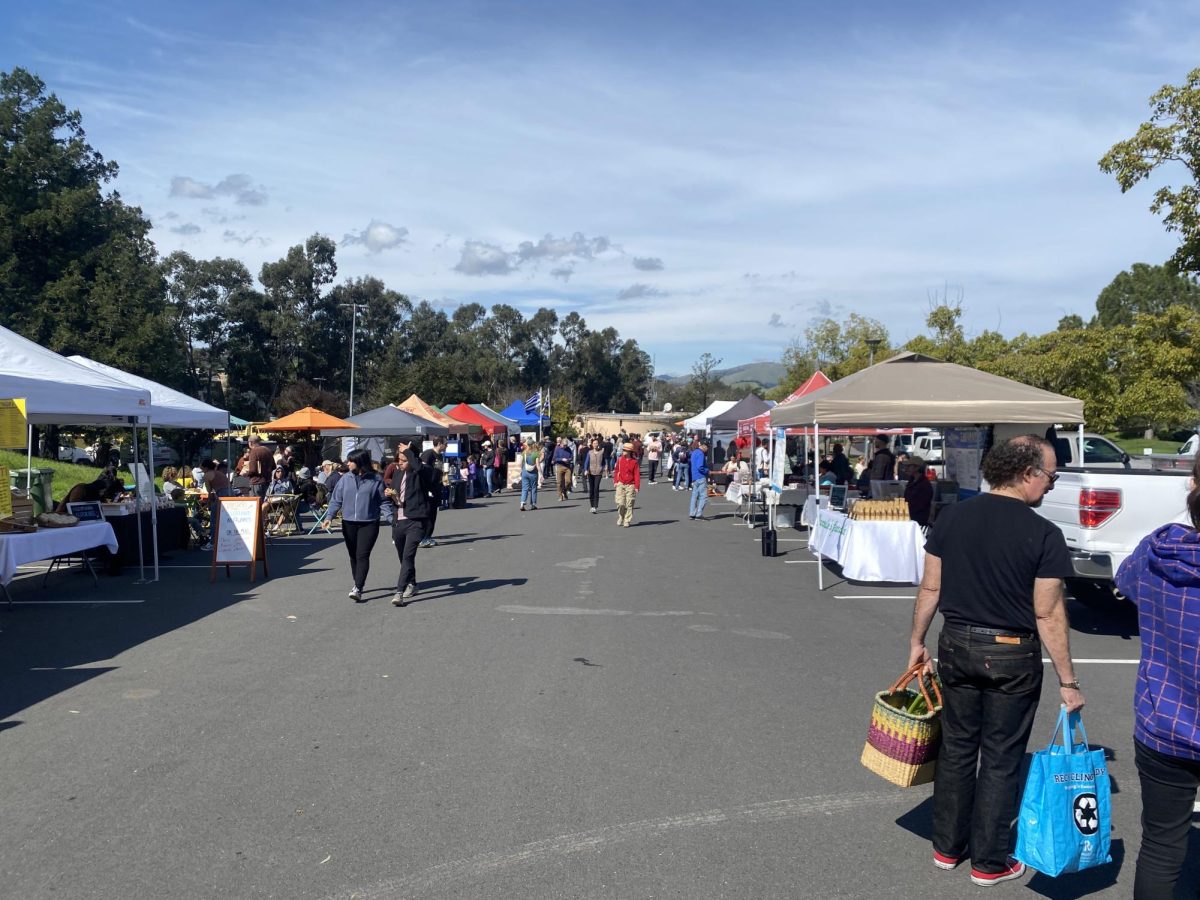Hace clic aquí para lee en español
The lack of diversity was Nicole Ramos’ and Daniela Cabrales’ first impression of Marin County and Redwood High School. They were immersed in Marin culture this summer after moving to California from El Salvador, and found that it wasn’t that easy to fit in because they are Hispanic, rather than White, according to Ramos. However, they feel that they have successfully created their own place among their peers at Redwood.
Cabrales and Ramos, juniors, left their home, their friends and Cabrales’ mom behind in San Salvador, El Salvador to join Ramos’s mother and stepfather in Belvedere, California.
Both Ramos and Cabrales have been United States citizens for all or almost all of their lives. Ramos was born in Martinez, California, but her family moved to El Salvador soon after she was born. And though Cabrales had never been to the United States before moving here, her father got her U.S. citizenship when she was young.
Both Ramos and Cabrales wanted to move out of El Salvador to start fresh, despite the challenges associated with the move.
“I was just trying to find something new for my life, get out of my comfort zone, not just stay in the same country with the same routine,” Ramos said.
Cabrales believes that there are more opportunities for Ramos and her in Marin in the realms of both academic and personal growth.
She also said that she has learned responsibility and self-reliance through living in Marin without her parents.
“The education is so much better [at Redwood],” Cabrales said. “And you get to be independent and I feel like I have learned so much from just being here in a lot of aspects.”

Although Cabrales believes she has become more self-sufficient while in Marin, she said that she encounters struggles because her parents are not in Marin with her. It is challenging for Cabrales to contact her parents and she misses the support they provided for her in El Salvador.
Cabrales’ mother still lives in El Salvador and works as a lawyer and translator for conferences and programs; her father travels with no permanent residence.
Cabrales’ sister, who is 19, attends university in Belgium. Between Cabrales’ move to Marin and her sister’s studies in Europe, they have had difficulty maintaining their close relationship.
“[My relationship has changed] with my sister mostly because she lives in Belgium and it is more of a time difference,” Cabrales said. “With my mom, it’s like two hours and with my sister it’s like a whole day. So when I wake up, she’s in school and then when I’m at home, she’s asleep. So it’s just hard to talk with her and she’s always busy.”
Cabrales’ relationship with her father has not drastically changed, as she did not see him that often in San Salvador either.
“We don’t talk that much, but he came to visit me [in Marin] in December and we did a road trip. We always have like a trip every year and stuff like that,” Cabrales said.
Ramos and Cabrales said that they have encountered challenges adapting to the new culture in Marin mostly because it differs from the culture they were used to in San Salvador.
“[El Salvador is] a small country. It was easier to get to know people and to interact with them,” Ramos said. “You don’t just know people from your school, but you also know people from different schools. I feel like their families are kind of closer with each other. I would have cousins living ten minutes away from me.”
The girls’ schooling in San Salvador also differed from their schooling at Redwood, which has been difficult for them.
In San Salvador, they attended a private school where half of their classes were taught in Spanish and the other half were taught in English.
Cabrales said that it has been hard to adjust to the style of teaching at Redwood.
“I’m not used to the way of teaching here, so I guess that is harder. Like letting us read on our own, it’s just more independent. I used to have more help,” Cabrales said.
Both girls said they have encountered small cultural differences that have added to their effort to adjust, such as differences in their ability to eat healthy foods and the logistics of school lunch.
At their school in San Salvador, students had to eat in the school building, as opposed to the freedom that Redwood students are given to go off campus for lunch.
Cabrales and Ramos both had maids in El Salvador who made their breakfasts and lunches. The girls said that this has been one of the biggest adjustments―packing their own lunches.
Ramos also said that it is harder to eat healthily in Marin than it was in San Salvador, mostly because she does not have someone to help her here.
“It’s just so hard to eat healthy here, for me. Over there [my maid] would for breakfast cook me eggs, beans and fresh cut fruit. I wouldn’t have to worry about peeling a pineapple or peeling a mango, and stuff like that,” Ramos said. “And when I got home, she would have my meal ready, whether it be like chicken or another meat or something like that. And here I have to like find something I can make myself super fast and easy, and it’s just hard.”
Cabrales and Ramos said that one of the reasons they struggled adapting to the new culture here is because people at Redwood already have developed friendships.
“It’s been hard to just adjust to a totally different culture and environment. English is not our first language and just making friends out of nowhere, [when] you are completely new, and people already have their friends, their cliques, just trying to talk to them is hard,” Ramos said.
Junior Daniela Hernandez met Ramos and Cabrales in English class and has helped make Cabrales’ and Ramos’ assimilation easier. Hernandez easily related to the position that Cabrales and Ramos are in; she moved to California from Mexico when she was in sixth grade, which allowed her to empathize with the girls and their situation.
Not only did Ramos and Cabrales come to Redwood as foreign students, but they also entered as juniors, which Hernandez believes made their transition harder. Hernandez said that as juniors, students have already developed friendships during their two years at Redwood and their previous middle and elementary school years.
Junior Jurany Pohl also helped Cabrales’ and Ramos’ transition into the Redwood community. Pohl moved here from Colombia in middle school and was able to relate to their experience.
Pohl said that Redwood students do not make that much of an effort to reach out to new students from foreign countries, but that the little effort that students put into reaching out to new students is beneficial for them.
“I think, from my experience, it was fine people not reaching out because I wanted to find things for myself. [Redwood students] help you, but they don’t do everything for you. So it’s easier to learn, and faster to learn if you do things for yourself,” Pohl said.
Part of adapting to the culture in the United States has included Cabrales and Ramos developing perspectives on U.S. politics.
If Ramos or Cabrales had been eighteen and able to vote in the last election, Ramos would have voted for President Trump, while Cabrales would have abstained from voting because she said she did not thoroughly understand any of the candidates’ policies.
Ramos said that being Christian, she and her family are pro-Israel and believe that Trump is as well. Cabrales thinks that because Ramos’ and her family’s views coincide with President Trump’s views on this topic, it allows her to understand his point of view.
Cabrales and Ramos are grateful to have each other to make their move easier. Both girls agreed that this experience would be much more difficult if they did not have each other.
“Since I have her and we have each other, it’s not that hard; we kind of support each other, and it makes everything a lot simpler. If I have a problem, or if I just need help with something, I have her, so it just makes everything easier,” Ramos said.
Ramos believes that she and Cabrales have created their own place among their peers.
“It’s fine to have friends and it feels good to be with other people, but we don’t need to fit in in order to be comfortable,” Ramos said. “Maybe [I did] not find my place, but I was able to blend in and play along with everything that’s going on. We created our own place.”
Cabrales said that they are now happy where they are among their peers.
Ramos plans to stay in the United States and hopes to attend university in California. In contrast, Cabrales does not hope to attend university in the U.S., but somewhere abroad.
“I just want something different. I like seeing different cultures so I would like Europe or South America or Asia,” Cabrales said.

















